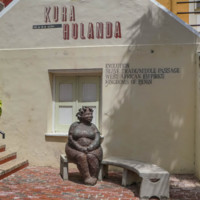
Kura Hulanda Museum
Situated on the grounds of a nineteenth-century merchant’s house and slave quarters, Kura Hulanda is an anthropological museum that focuses on the cultures of Curacao. Its displays examine a wide range of subjects from the origins of man, the African slave trade, and West African Empires, to Pre-Colombian gold, Mesopotamian relics and Antillean art. The museum is located in the central harbour of Willemstad, where Dutch merchants traded enslaved Africans and commercial goods. Kura Hulanda Museum demonstrates the influence that African and other diverse cultural heritages have had on Curaçaoan and Caribbean societies through time to the present day. It is managed by the Curaçao Tourist Board. The museum's exhibits trace Curaçaoans African roots and the legacy of the slave trade in the region with collections of art and artefacts from West Africa, illustrating the African influences on Caribbean culture. Displays chart African civilisations, the Middle Passage, life on the plantations, abolition and apprenticeship. There is a model of a slave ship, alongside examples of African bronze work, and instruments that showcase the brutal nature of enslavement. Other displays bring the narrative closer to the present day, examining the Civil Rights movement in the USA with panels relating to the Black Panthers, Martin Luther King and Malcolm X.